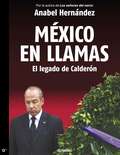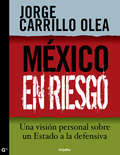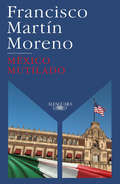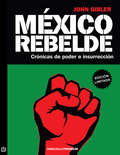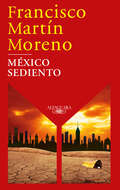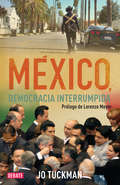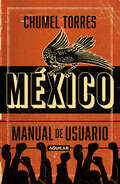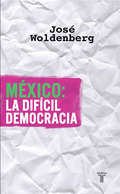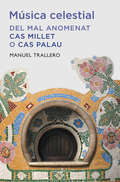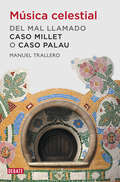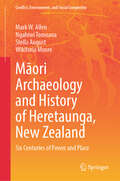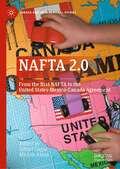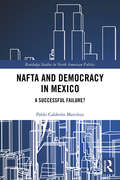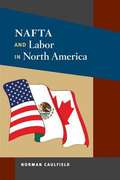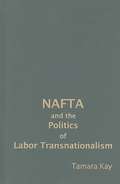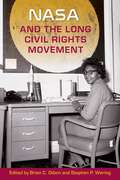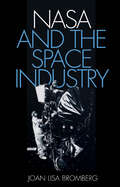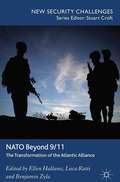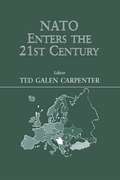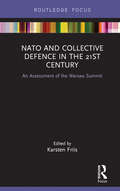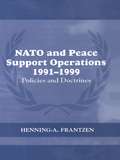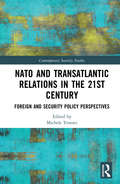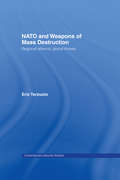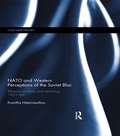- Table View
- List View
México en Llamas: el legado de Calderón
by Anabel HernándezTras el rotundo éxito obtenido con Los señores del narco, Anabel Hernández nos entrega un libro clave para entender el legado que deja Felipe Calderón, quien será recordado, de acuerdo con la periodista, como el "presidente del exterminio". México en llamas: el legado de Calderón constituye una indispensable revisión crítica y una enérgica denuncia de los casos más escandalosos de corrupción y complicidad política del llamado "sexenio de la muerte", donde destacan nombres tan diversos como Manuel Bribiesca Sahagún, Genaro García Luna, Guillermo Galván Galván, Mario Arturo Acosta Chaparro, Isabel Miranda de Wallace y Carlos Salinas de Gortari. Felipe Calderón Hinojosa, asegura Anabel Hernández, será recordado por los cinco principales legados de su gobierno: el infinito poder del narcotraficante Joaquín El Chapo Guzmán; el asesinato impune de más de 60 mil personas -víctimas de la llamada guerra contra el narcotráfico-; la destrucción de su partido político, el PAN; un México controlado por cárteles, grupos de criminales y brigadas de mercenarios; y el regreso del PRI a Los Pinos. Para la periodista, los resultados de la estrategia fallida del panista son palpables: el incremento acelerado en el consumo y la producción de estupefacientes, así como la penetración del crimen organizado en las instituciones encargadas de brindar seguridad e impartir justicia: el ejército, la Marina, la SSP, la PGR y el Poder Judicial# ni una sola se ha librado del escándalo. El propósito fundamental de esta obra es informar a la sociedad y darle elementos para exigir justicia. A fin de cuentas, explica la autora, "la única forma de mantener nuestra esperanza en un futuro mejor, de que podamos desterrar este México de muerte e impunidad, es asegurarnos de que lo que ocurrió durante estos últimos seis años no se repita".
México en riesgo
by Jorge Carrillo OleaUna vision personal sobre un Estado a la defensiva Jorge Carrillo Olea, pionero en el estudio de la seguridad nacional y delos servicios de inteligencia en México, ocupó diversas posiciones privilegiadas durante cuatro sexenios Luis Echeverría, José López Portillo, Miguel de la Madrid y Carlos Salinas, tanto por sus cargos públicos como por la proximidad que mantuvo con los titulares del Ejecutivo. En consecuencia, pudo observar desde la barrera de primera fila cómo se ha gobernado esta nación: con todos sus ritos, dogmas,valores, angustias, delirios, esperanzas, aciertos y equívocos.Sin duda, en la trayectoria profesional del autor hay muchos episodios insospechados y otros que necesitan aclararse, cosa que él mismo hace en esta obra. Entre otros sucesos, nos explica cómo fue usado el Estado Mayor el 2 de octubre de 1968; la peripecia para rescatar a Echeverría en la UNAM cuando fue agredido por los estudiantes; el papel que desempeñó México durante el golpe de Estado en Chile; el asesinato de Manuel Buendía en 1984; los momentos críticos que se vivieron tras el terremoto de 1985; la caída del sistema en 1988; el operativo donde aprehendieron a Joaquín El Chapo Guzmán en 1993; los pormenores de su gubernatura en Morelos y la pugna a muerte con Ernesto Zedillo.Tales elementos, en conjunto, le permiten a Carrillo Olea extraer valiosas conclusiones y hacer un ajuste de cuentas para conducir la reflexión hacia el crítico momento actual. En esa medida, el propósito del libro no consiste en esbozar una suerte de memorias, se trata más bien de hacer un riguroso análisis sobre el Estado mexicano y los problemas que afronta a partir de una clave fundamental: la seguridad nacional, condición esencial para la construcción de un proyecto de país que los gobiernos posrevolucionarios de cualquier orientación siempre menospreciaron.
México en riesgo: Una visión personal sobre un Estado a la defensiva
by Jorge Carrillo OleaJorge Carrillo Olea, controvertido protagonista y testigo de la vida política nacional, ofrece su visión sobre hechos relevantes que determinaron el curso de la historia contemporánea de nuestro país, así como un análisis sobre cómo desembocaron en la actual crisis de seguridad nacional. Una visión personal sobre un Estado a la defensiva. Jorge Carrillo Olea, pionero en el estudio de la seguridad nacional y de los servicios de inteligencia en México, ocupó diversas posiciones privilegiadas durante cuatro sexenios -Luis Echeverría, José López Portillo, Miguel de la Madrid y Carlos Salinas- tanto por sus cargos públicos como por la proximidad que mantuvo con los titulares del Ejecutivo. En consecuencia, pudo observar desde la barrera de primera fila cómo se ha gobernado esta nación: con todos sus ritos, dogmas, valores, angustias, delirios, esperanzas, aciertos y equívocos. Sin duda, en la trayectoria profesional del autor hay muchos episodios insospechados y otros que necesitan aclararse, cosa que él mismo hace en esta obra. Entre otros sucesos, nos explica cómo fue usado el Estado Mayor el 2 de octubre de 1968; la peripecia para rescatar a Echeverría en la UNAM cuando fue agredido por los estudiantes; el papel que desempeñó México durante el golpe de Estado en Chile; el asesinato de Manuel Buendía en 1984; los momentos críticos que se vivieron tras el terremoto de 1985; la caída del sistema en 1988; el operativo donde aprehendieron a Joaquín El Chapo Guzmán en 1993; los pormenores de su gubernatura en Morelos y la pugna a muerte con Ernesto Zedillo. Tales elementos, en conjunto, le permiten a Carrillo Olea extraer valiosas conclusiones y hacer un ajuste de cuentas para conducir la reflexión hacia el crítico momento actual. En esa medida, el propósito del libro no consiste en esbozar una suerte de memorias, se trata más bien de hacer un riguroso análisis sobre el Estado mexicano y los problemas que afronta a partir de una clave fundamental: la seguridad nacional, condición esencial para la construcción de un proyecto de país que los gobiernos posrevolucionarios de cualquier orientación siempre menospreciaron.
México mutilado
by Francisco Martín Moreno¿Con arreglo a qué razón inconfesable se nos ha ocultado a los mexicanos la verdadera historia patria en los últimos 170 años? México mutilado es un grito de denuncia, de rabia, de impotencia. ¿Por qué los mexicanos hemos hablado tan escasamente de la guerra de 1846 contra Estados Unidos? ¿Por qué nos hemos negado a evaluar los alcances de la catastrófica derrota que tuvo como resultado, entre otros males, la pérdida de la mitad del territorio nacional? ¿Por qué no nos atrevemos a ver la herida agusanada por la que supuramos hasta la fecha? Con su conocida prosa vertiginosa -un tobogán que nos lleva hasta las mismas entrañas de México-, Francisco Martín Moreno nos revela cómo conspiraron, en contra de su propio país, los altos jerarcas de la iglesia, distinguidos generales, presidentes de la República, destacados criollos, aristócratas, empresarios, periodistas, gobernadores, diputados y senadores. ¿La letra del himno nacional debería de ser: Mexicanos, sálvese el que pueda...? ¿Qué aprendimos de la guerra y de la traumática experiencia? ¿Acaso hoy, a más de 170 años, los mexicanos somos más unidos, más cultos, más preparados y hemos disminuido la distancia que nos separa de Estados Unidos? Por lo visto, nadie repara en que quien no conoce su historia está condenado a repetirla, con todas sus funestas consecuencias. Sin duda, los intereses creados fueron de tal magnitud que resultó más conveniente esconder la realidad que echar luz sobre nuestro pasado para desenmascarar, de una vez y para siempre, a los auténticos enemigos de México. México mutilado es una novela política que nos arroja en pleno rostro las explicaciones que nunca se atrevieron a darnos.
México rebelde
by John GiblerLa conquista de un México, soberano e independiente, nunca ha estado en manos mexicanas sinceras. A pesar del protagonismo popular de las revueltas (la Independencia, la Revolución, la guerrilla y algunos movimientos políticos), sus autores han olvidado repentinamente la ayuda para dejarlos en segundo plano sin asegurar un poder democrático pleno la traición política, injerencias extranjeras y mezquindades personales han evitado la transición soñada. En este libro, John Gibler da cuenta de estas situaciones incómodas que el poder soporta, para demostrar que a pesar del desencanto, la lucha todavía se mantiene. Las crónicas que conforman este libro son el resultado de varios años de trabajo y compenetración del periodista independiente John Gibler con el México de abajo: con la pobreza y la desigualdad, con los presos políticos y las víctimas de la violencia estatal, con el movimiento popular de Oaxaca, con la lucha de los campesinos de Atenco, con las comunidades rebeldes zapatistas y con otros movimientos de insurrección. Ésta es una obra clave del periodismo contemporáneo que les da voz a los protagonistas invisibles de la historia y nos permite adentrarnos en el otro México, ahí donde siempre irrumpe el incansable espíritu de rebelión y protesta que lleva a la gente a arriesgarlo todo -incluso sus vidas- y a emprender acciones radicales para defender su tierra, su autonomía y su dignidad. En palabras del autor, México rebelde es una convocatoria urgente para repensar las estrategias de resistencia frente al poder y expandir la imaginación política.
México sediento
by Francisco Martín Moreno«El problema de la disponibilidad de agua en la cuenca del valle de México es una verdadera bomba de tiempo para la ciudad más poblada del planeta.» ¿Podemos imaginar que una sequía pudiera hacer estallar en pedazos el pacto federal mexicano porque un estado, por supervivencia, se negara a dar agua al vecino, o a la mismísima capital de la República? Francisco Martín Moreno da la voz de alarma respecto a la posibilidad de una nueva sequía, como las que han azotado al valle de México desde la época prehispánica. Con su prosa vigorosa y su incansable imaginación, nos revela que la sequía fue el gran detonador de la guerra de Independencia, como también lo fue de la Revolución de 1910. Si se aceptara que ésta determinó nuestro pasado, tomaríamos las medidas para evitar daños posteriores y nos adelantaríamos al futuro para impedir que la catástrofe se apodere de nuevo del destino de la nación. Esta novela, repleta de intrigas políticas, erotismo y anticipación ecológica, nos enseña lo que puede ser el México del mañana si no se da un oportuno y firme golpe de timón.
México, democracia interrumpida
by Jo TuckmanDesde 2000, año clave en el devenir político mexicano, la periodista británica Jo Tuckman, corresponsal de The Guardian en México, ha sido una observadora perspicaz de nuestra realidad nacional. Así, por medio de un análisis riguroso, estas páginas constituyen la instantánea de un mosaico donde confluyen historias de narcotráfico, religión, futbol, poderes fácticos omnipresentes, bombas de tiempo ambientales y, finalmente, los anhelos y los sueños de una compleja sociedad que se debate en una eterna búsqueda de identidad.La presente obra representa una gran exploración, no exenta de estupores y fascinaciones, a través de la historia del sistema político mexicano contemporáneo: desde su paradójico alumbramiento como revolucionario e institucional hasta la actualidad del regreso del PRI al poder tras 12 años de gobiernos panistas.Entre otros, episodios como el surgimiento de la sociedad civil en 1985; la descentralización del poder político que dio insospechados márgenes de maniobra y abuso a gobernadores y ediles; el movimiento zapatista; la fuga del Chapo Guzmán; la represión en Atenco; el incendio de la guardería ABC; y los vaivenes de la derecha y la izquierda son el marco para el veredicto central de Tuckman: México vive una democracia interrumpida.A pesar de todo, la luminosa visión crítica de la investigación también pone de relieve los intersticios donde aún se respiran aires de esperanza.
México, manual de usuario: Guía para -no-habitar este país mágico y en ruinas
by Chumel TorresEl país -como cada seis años, o mejor dicho: cada año- se encuentra en un momento crítico de inestabilidad económica, corrupción, deshonestidad política, indolencia ante los problemas sociales...¿y ahora quién podrá defendernos? Fiel a su estilo y con un humor salvaje, Chumel Torres ofrece en este libro una reflexión sobre lo que nos distingue como mexicanos: Quiénes son nuestros héroes, por qué ya no creemos en las instituciones, a quién veneramos y por qué sentimos rencor a los gringos cuando adoptamos su cultura capitalista sin chistar. El libro es una burla y una serie de sarcasmos bien documentados, pero también es una reflexión profunda del México violento, trágico y delirante donde reina la impunidad, la trampa, el desfalco, a pesar de tener seres humanos grandiosos en las ciencias y en las artes. El país se cae en pedazos, la 4T se aferra a sus mentiras, la economía se encuentra en niveles alarmantes y las desgracias en materia de seguridad nacional, salud y transparencia están a la orden del día. Con humor corrosivo, desafiante y artero, Chumel Torres elabora un manual cínico y divertido para vivir –mejor dicho, sobrevivir-en este México de políticos corruptos, narco-reyes, partidos de oposición ahogados en sus propias miserias y un tejido social tocado por la pobreza, la violencia y la injusticia. México: manual de usuario es una reflexión corrosiva sobre nuestra realidad nacional, una explicación de por qué vivimos esta desgracia política y qué hacer como sociedad para frenar la destrucción social, económica y política del país. A manera de un delirante libro de Civismo 3 de nuestra secundaria pública, Chumel Torres habla de los nuevos héroes nacionales, de los deportistas que alcanzaron la gloria y de personajes que dan relumbre a nuestro cine nacional, no sólo Carmen Salinas y Alfonso Zayas, rescata de la sombra a quienes se esfuerzan por dignificar la palabra mexicano y mediante el dato duro, la estadística y la indagación rigurosa nos dice qué tan lejos está México de los niveles de felicidad mundial, por qué en materia de Salud somos una desgracia y con quiénes competimos por ser los numero uno del mundo en obesidad, delincuencia organizada o corrupción, sin duda, un libro feroz, súper divertido e implacable.
México: la difícil democracia
by José WoldenbergUn libro incisivo y penetrante que medita sobre los logros y los retos de la democracia en México. <P><P>México: la difícil democracia contiene el testimonio y el pensamiento político de uno de los artífices de la democracia mexicana. Su tema es justamente éste: la democracia como forma de gobierno, los principios políticos que la sustentan, la historia de la transición, los retos del sistema electoral mexicano, el contexto social en su relación con ese sistema y los principales obstáculos que enfrentan la equidad y el Estado de derecho en nuestro país. <P><P>México fue capaz de construir una democracia germinal. Motivadas por conflictos recurrentes, sus principales fuerzas políticas lograron desmontar un sistema autoritario de gobierno para dar paso a otro en el que se reproduce, contiende y convive la pluralidad política del país. <P><P>Pero la democracia no es un puerto de llegada ni un sombrero de mago. Su consolidación y su futurono están garantizados, y tampoco contiene las claves para resolver todos los problemas de México. Como fórmula de gobierno, la democracia se desarrolla en un marco plagado de retos y, por lo tanto, puede fortalecerse o desgastarse.
Música celestial (edició en catalá): Del mal anomenat cas Millet o cas Palau
by Manuel TralleroLa veritable història del Caso Palau, o de com Félix Millet va comprar la classe política catalana. El periodisme no es pot limitar a narrar el que succeeix, ha d'intentar explicar el perquè, en això consisteix la veritable informació. Per aconseguir-ho, Música celestial va més enllà de l'anècdota. No hi ha un «cas Palau» ni un «cas Millet». Convertir-lo en un més dels molts casos de corrupció que esquitxen el país és reduir el que va passar a un simple delicte i centrar l'atenció en uns delinqüents. Però això escatimaria a l'opinió pública una explicació completa i una interpretació del que es va esdevenir. Quan la policia va entrar al Palau, els fonaments de la societat catalana i el pacte vigent des de la Transició es van esmicolar de tal manera, que, tot i el clamorós silenci imposat, encara avui no se n'han refet. La classe política, les administracions, els mitjans de comunicació, la justícia, l'anomenada societat civili el mateix Orfeó Català encara han de passar comptes. Aquesta és la raó d'aquest llibre: explicar el que va passar i exigir els comptes.
Música celestial: Del mal llamado caso Millet o caso Palau
by Manuel TralleroLa verdadera historia del Caso Palau, o cómo Félix Millet compró a la clase política catalana. El periodismo no debe limitarse a narrar lo que ocurre, debe tratar de explicar el porqué, en eso consiste la verdadera información. Para lograrlo, Música celestial va más allá de la anécdota de lo sucedido. No existe un "caso Palau" ni un "caso Millet". Convertirlo en uno más de los muchos casos de corrupción que salpican el país es reducir lo ocurrido a un simple delito y centrar la atención en unos delincuentes. Pero eso hurtaría a la opinión pública una explicación completa y una interpretación de lo acaecido. Cuando la policía entró en el Palau, los fundamentos de la sociedad catalana y el pacto vigente desde la Transición sufrieron un resquebrajamiento total del cual, a pesar del clamoroso silencio impuesto, todavía hoy no se han repuesto. La clase política, las administraciones, los medios de comunicación, la justicia, la llamada sociedad civil y el propio Orfeó Català todavía deben rendir cuentas. Esta es la razón de este libro: explicar lo que pasó y exigirlas.
Māori Archaeology and History of Heretaunga, New Zealand: Six Centuries of Power and Place (Conflict, Environment, and Social Complexity)
by Mark W. Allen Ngahiwi Tomoana Stella August Wikitoria MooreThis book uses Māori Kaupapa (a Māori approach, practice) to provide unique insights toward the anthropological understanding of power and place in Heretaunga, New Zealand. It examines the power of Māori leaders and ancient and modern archaeological and historical landscapes over the past six centuries. It highlights Māori warfare, characterized by impressive fortifications known as pā. Severe impacts of the colonial period are also discussed, including demographic calamity, changes in settlement pattern, and the innovative ways that Māori leaders sought to navigate the last half of the nineteenth century. Recent history and modern issues are examined as well, particularly the rise of tribal self-government. Importantly, the roles of female leaders are examined for each period. This book will be of interest across many disciplines for those interested in conflict and warfare, complex pre-state level societies, colonialism, power and women, and indigenous adaptions to globalization.
NAFTA 2.0: From the first NAFTA to the United States-Mexico-Canada Agreement (Canada and International Affairs)
by Michèle Rioux Gilbert GagnéThe renegotiation and possible termination of the North American Free Trade Agreement (NAFTA) sparked a lot of interest and concern in light of the United States’ declared objective to “rebalance the benefits” of the agreement. This edited book provides an overview of the changes brought to the NAFTA by the United States-Mexico-Canada Agreement (USMCA) or NAFTA 2.0. Grouping leading academics and experts from the three countries, the book covers the major topics in the transition from the NAFTA to the USMCA. The book also sheds light on the evolution of North American economic integration within the past three decades and reflects on the significance of the regional integration model represented by the NAFTA and now the USMCA. The book is aimed at scholars, students, officials, professionals and interested citizens concerned by the big issues surrounding North American integration and economic globalization.
NAFTA and Democracy in Mexico: A Successful Failure? (Routledge Studies in North American Politics)
by Pablo Calderón MartínezAfter describing NAFTA as ‘the worst trade deal maybe ever signed anywhere’, Donald Trump’s election seemed to represent the final nail in the coffin for North American economic integration. Following a decade of stagnation, however, Trump’s victory presents a timely opportunity to reconsider North American integration and evaluate NAFTA’s democratic track record in Mexico. In this book, Pablo Calderón Martínez presents a detailed analysis of NAFTA’s influence as a political tool for democracy in Mexico. Extending beyond a mere economic or social exploration of the consequences of NAFTA, Calderón Martínez uses a three-tiered analysis based on causality mechanisms to explain how the interactions between internationalisation and democratisation unfolded in Mexico. Calderón Martínez’s analysis demonstrates that Mexico’s internationalisation project under the framework of NAFTA gave shape to, if not made, Mexico’s democratisation process. An original and timely resource for scholars and students interested in understanding how – in cases like Mexico where transitions to democracy are characterised by a finely poised balance of power – small influences from abroad can make significant long-lasting differences domestically.
NAFTA and Labor in North America (The Working Class in American History)
by Norman CaulfieldAs companies increasingly look to the global market for capital, cheaper commodities and labor, and lower production costs, the impact on Mexican and American workers and labor unions is significant. National boundaries and the laws of governments that regulate social relations between laborers and management are less relevant in the era of globalization, rendering ineffective the traditional union strategies of pressuring the state for reform. Focusing especially on the effects of the North American Free Trade Agreement and the North American Agreement on Labor Cooperation (the first international labor agreement linked to an international trade agreement), Norman Caulfield notes the waning political influence of trade unions and their disunity and divergence on crucial issues such as labor migration and workers' rights. Comparing the labor movement's fortunes in the 1970s with its current weakened condition, Caulfield notes the parallel decline in the United States' hegemonic influence in an increasingly globalized economy. As a result, organized labor has been transformed from organizations that once pressured management and the state for worker concessions to organizations that now request that workers concede wages, pensions, and health benefits to remain competitive in the global marketplace.
NAFTA and the Politics of Labor Transnationalism
by Tamara KayWhen NAFTA went into effect in 1994, many feared it would intensify animosity among North American unions, lead to the scapegoating of Mexican workers and immigrants, and eclipse any possibility for cross-border labor cooperation. But far from polarizing workers, NAFTA unexpectedly helped stimulate labor transnationalism among key North American unions and erode union policies and discourses rooted in racism. The emergence of labor transnationalism in North America presents compelling political and sociological puzzles: How did NAFTA, the concrete manifestation of globalization processes in North America, help deepen labor solidarity on the continent? In addition to making the provocative argument that global governance institutions can play a pivotal role in the development of transnational social movements, this book suggests that globalization need not undermine labor movements: collectively, unions can help shape how the rules governing the global economy are made.
NASA and the Long Civil Rights Movement
by Brian C. Odom and Stephen P. WaringAmerican Astronautical Society Eugene M. Emme Astronautical Literature Award <p><p> As NASA prepared for the launch of Apollo 11 in July 1969, many African American leaders protested the billions of dollars used to fund “space joyrides” rather than help tackle poverty, inequality, and discrimination at home. This volume examines such tensions as well as the ways in which NASA’s goal of space exploration aligned with the cause of racial equality. It provides new insights into the complex relationship between the space program and the civil rights movement in the Jim Crow South and abroad. <p><p> Essays explore how thousands of jobs created during the space race offered new opportunities for minorities in places like Huntsville, Alabama, while at the same time segregation at NASA’s satellite tracking station in South Africa led to that facility’s closure. Other topics include black skepticism toward NASA’s framing of space exploration as “for the benefit of all mankind,” NASA’s track record in hiring women and minorities, and the efforts of black activists to increase minority access to education that would lead to greater participation in the space program. The volume also addresses how to best find and preserve archival evidence of African American contributions that are missing from narratives of space exploration. <p><p> NASA and the Long Civil Rights Movement offers important lessons from history as today’s activists grapple with the distance between social movements like Black Lives Matter and scientific ambitions such as NASA’s mission to Mars.
NASA and the Space Industry (New Series in NASA History)
by Joan Lisa BrombergA timely exploration of the relationships between NASA and the private sector: “An interesting read.” —SpaceflightFew federal agencies have more extensive ties to the private sector than NASA. NASA’s relationships with its many aerospace industry suppliers of rocket engines, computers, electronics, gauges, valves, O-rings, and other materials have often been described as “partnerships.” These have produced a few memorable catastrophes, but mostly technical achievements of the highest order. Until now, no one has written extensively about them.In NASA and the Space Industry, Joan Lisa Bromberg explores how NASA’s relationship with the private sector developed and how it works. She outlines the various kinds of expertise public and private sectors brought to the tasks NASA took on, describing how this division of labor changed over time. She explains why NASA sometimes encouraged and sometimes thwarted the privatization of space projects and describes the agency’s role in the rise of such new space industries as launch vehicles and communications satellites.
NATO Beyond 9/11
by Benjamin Zyla Ellen Hallams Luca RattiThis collection reflects on the significance of the 9/11 terrorist attacks for the transatlantic alliance. Offering an analysis of NATO's evolution since 2001, it examines key topics such as the alliance's wars in Afghanistan, its military operation in Libya, global partnerships, burden-sharing and relations with the US and Russia.
NATO Enters the 21st Century
by Ted Galen CarpenterNATO's military intervention in Yugoslavia highlights the choices and problems confronting the alliance as it approaches the new century. An alliance created to keep Western Europe out of the Soviet orbit during the Cold War has sought to reinvent itself as a "crisis-management" organization to suppress conflicts on Europe's periphery - and perhaps beyond.Is NATO suited to playing such a role, or is the alliance a Cold War anachronism? How will Russia react to an enlarged NATO focused on out-of-area peacekeeping and conflict-prevention missions? Are there alternative security institutions that might better address Europe's security needs in the post-Cold War era?
NATO and Collective Defence in the 21st Century: An Assessment of the Warsaw Summit
by Karsten FriisThis book presents a cutting-edge assessment of NATO's collective defence strategies in the immediate aftermath of the July 2016 NATO Warsaw Summit. Collective defence and deterrence came back on the agenda at the 2014 Wales Summit following the Russian annexation of Crimea, and was in many respects a game changer for NATO. The Warsaw Summit was a follow-up and operationalization of the Wales Summit, as well as adding further initiatives to the agenda. But is NATO delivering? This book provides a thorough assessment of the on-going debates and discussions taking place within and outside of NATO in Europe and North America. In its return to deterrence, NATO is confronted with challenges relating to strategic thinking, capability development, and the role of nuclear weapons. It has also raised questions about the future prospects for NATO membership for countries such as Sweden and Finland, with broader implications for the security situation in the Baltic region. Central to all this is of course NATO’s relationship with Russia and questions of a new security dilemma, in turning bringing to the fore the challenge of maintaining an appropriate balance between deterrence and dialogue. The chapters in this volume address these questions and provide a much-needed analysis of the results of the NATO Warsaw Summit. This book will be of interest to policymakers and students of NATO, international security, European Politics, security studies and IR in general.
NATO and Peace Support Operations, 1991-1999: Policies and Doctrines (Cass Series on Peacekeeping)
by Henning FrantzenThis new book addresses the key question of how NATO and three of its member states are configuring their policies and military doctrines in order to handle the new strategic environment. This environment is increasingly dominated by 'new wars', more precisely civil wars within states, and peacekeeping as the strategy devised by outside actors for dealing with them. The book seeks to explain how this new strategic environment has been interpreted and how the new conflicts and peacekeeping have been fitted into 'defence' and 'war' - key concepts in the field of security studies.
NATO and Transatlantic Relations in the 21st Century: Foreign and Security Policy Perspectives (Contemporary Security Studies)
by Michele TestoniThis book explores the evolution and future relevance of NATO from the perspective of the member-states. Addressing the overarching question of the relevance of transatlantic relations in the 21st century, the volume has three core objectives. The first is to reinforce the view that international alliances serve not only an external-oriented goal, but also a domestic-oriented aim, which is to control others’ behaviour. The second is to show that tensions amongst NATO allies have become more acute and, therefore, more dangerous. The third is to discuss current transatlantic relations through the adoption of a "second image" perspective; that is, one that emphasizes the multiple vertical linkages that connect NATO to the politics and the policies of each ally. The chapters presented here are built on a dual approach: on the one hand, they look at the place the Alliance occupies in the domestic public debate and the strategic culture of specific member states; on the other, they analyze how each of these countries contributes to NATO’s operations and what interests and visions they share for the Alliance’s future. This book will be of much interest to students of NATO, international organizations, foreign policy, and security studies in general.
NATO and Weapons of Mass Destruction: Regional Alliance, Global Threats (Contemporary Security Studies)
by Eric TerzuoloNATO was hugely successful in facing off the Soviet Union during the Cold War. But has it been equally successful in addressing the "new threats" of the post-Cold War era? This new study assesses the organization's political and military initiatives, and how its outreach to Russia, Ukraine, and other countries in the Euro-Atlantic and Mediterranean regions, devoted considerable attention to WMD proliferation risks. It also probes the political factors, both inside and outside NATO, as well as resource constraints, which have limited the alliance's "added value" in the international community's effort to combat proliferation. The events of 11 September 2001 and bitter intra-alliance controversy over the 2003 Iraq intervention have highlighted questions regarding NATO's future role, and even its continued viability. This is a serious reflection on how the alliance should figure in the fight against WMD and terrorist threats and an examination of today's key issues, including the use of force in international relations and the possibility of constructing new, post-Cold War collective security rules. This is the first study to evaluate, critically and in-depth, how a long-standing security organization has adapted - and must continue to adapt - to the global security challenges of our time. This book will be of great interest to all students and scholars of international politics, military history and all readers interested in the future of NATO and international security.
NATO and Western Perceptions of the Soviet Bloc: Alliance Analysis and Reporting, 1951-69 (Cold War History)
by Evanthis HatzivassiliouThis book examines the NATO reports on the Soviet bloc's political and economic system, from 1951 to the aftermath of the Soviet invasion of Czechoslovakia and the beginning of detente. As part of the wider history of Cold War Alliances, the detailed assessments of the NATO experts regarding the non-military aspects of Soviet power are a crucial indicator of Western/allied perceptions of the adversary. Their study allows us to widen the discussion on the Western alliance, the accuracy of its information or perceptions, and the nature of the Cold War. Hatzivassiliou argues that the Cold War was not only a strategic dilemma (although it certainly was that, as well), but also the latest stage of the crisis of legitimization which had been raging since the dawn of modernity. NATO/Western analysis is examined in this context. At the same time, the book discusses the relative influence of the major NATO members – US and British influence was strong while French, West German and Italian influence was also significant – in the drafting of the reports, and thus in shaping the alliance’s perceptions during the Cold War. This book will be of much interest to students of NATO, Cold War Studies, international history, foreign policy and IR in general.
